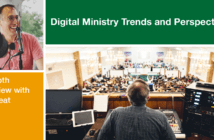In our U.S. Congregational Life Survey, worshipers rated the extent to which ten factors influence their decision to give to their congregation. The most important is gratitude. About half said they give to the congregation because they feel a sense of gratitude for God’s love and goodness. (49% said this is a major influence on giving decisions.) More than one in three worshipers say they give to support God’s work in the world. Giving out of a sense of duty was the third most important influence. It motivated the giving of about one in three worshipers. The fourth most important influence rests on the church’s teaching that the Bible instructs believers to support their congregation. One in four worshipers described this as a major influence. Finally, the last major influence in the top five is sense of obligation to support the work of their local congregation.
Worshipers want to know how their contributions make a difference. Congregational leaders should highlight the specific ways that worshipers’ financial gifts are changing lives in the congregation and the community.
The remaining five factors rated by worshipers are less important in their motivations for giving. Hearing about specific needs was rated sixth (23%). The seventh most influential factor is a sense of gratitude for help that the worshiper and his or her family receive from their involvement; about one in five worshipers said this was a major influence. Very few worshipers rated the last two factors as major influences on congregational giving?the congregation’s or leader’s urging to give and possible tax benefits.
How can leaders encourage financial giving?
First, worshipers want to know how their contributions make a difference. Congregational leaders should highlight the specific ways that worshipers’ financial gifts are changing lives in the congregation and the community. The emphasis should be on ministry rather than on supporting programs.
Second, leaders can help worshipers become percentage givers. Currently, only about 14 percent of worshipers said they decide how much to give based on a percentage of their income. In a national study of giving, researchers found that worshipers in “percentage-giving churches” contribute three times more dollars than worshipers in congregations that ask for offerings in dollar amounts (Money Matters, Dean Hoge, et al., Westminster John Knox, 1996). In percentage-giving churches worshipers are asked, “What percentage of your income do you feel God is calling you to give?” This question is consistent with the Bible’s instructions about giving.
Third, only a very small percentage of worshipers report that the urging of the congregation or leader is a major influence on their financial decision-making. Is this because it rarely happens? Congregational leaders can emphasize that financial giving is a spiritual matter? an opportunity to express gratitude to God and contribute to God’s work.
This article is adapted from an article that appeared on the U.S. Congregational Life Survey’s blog.






